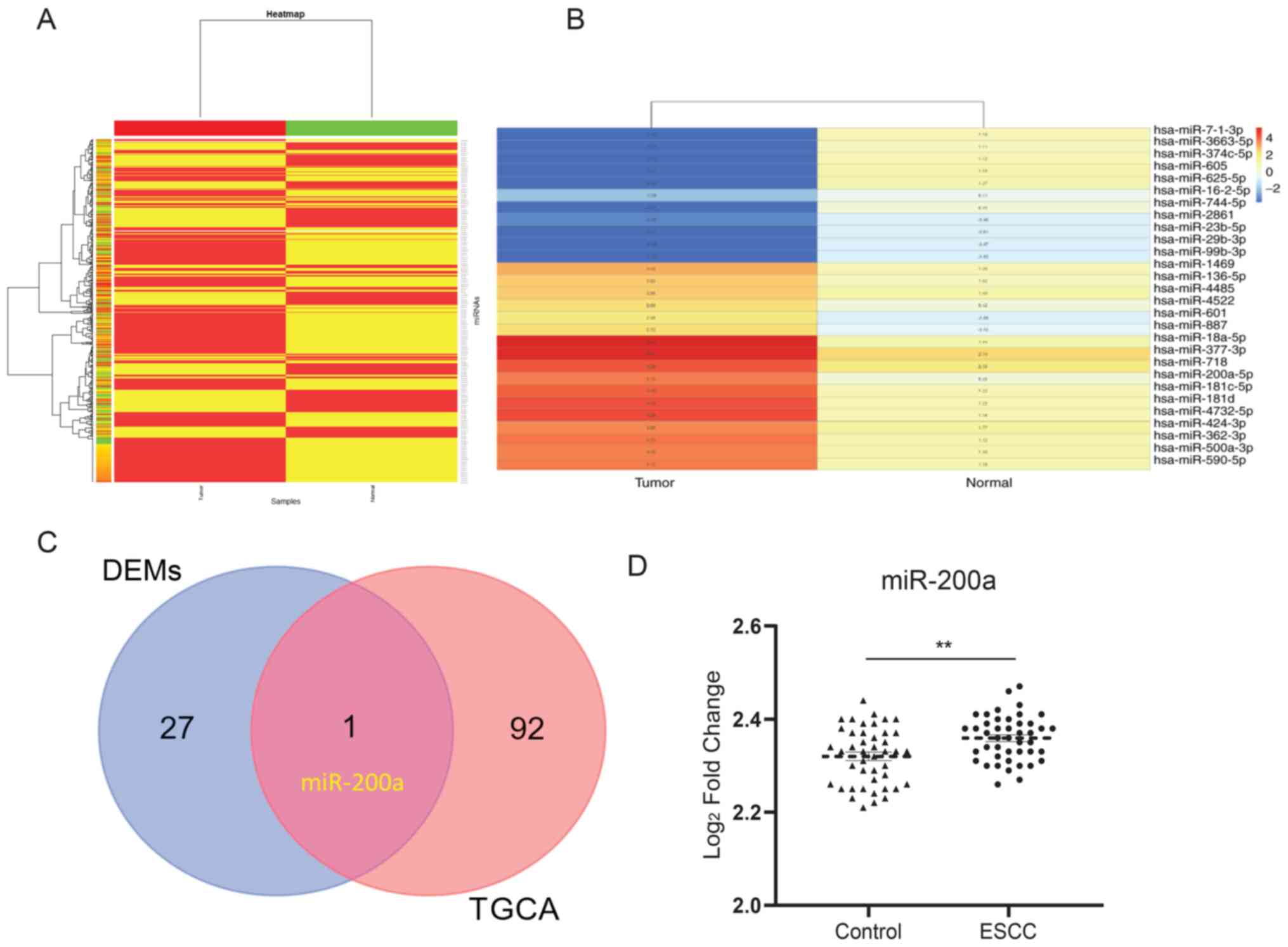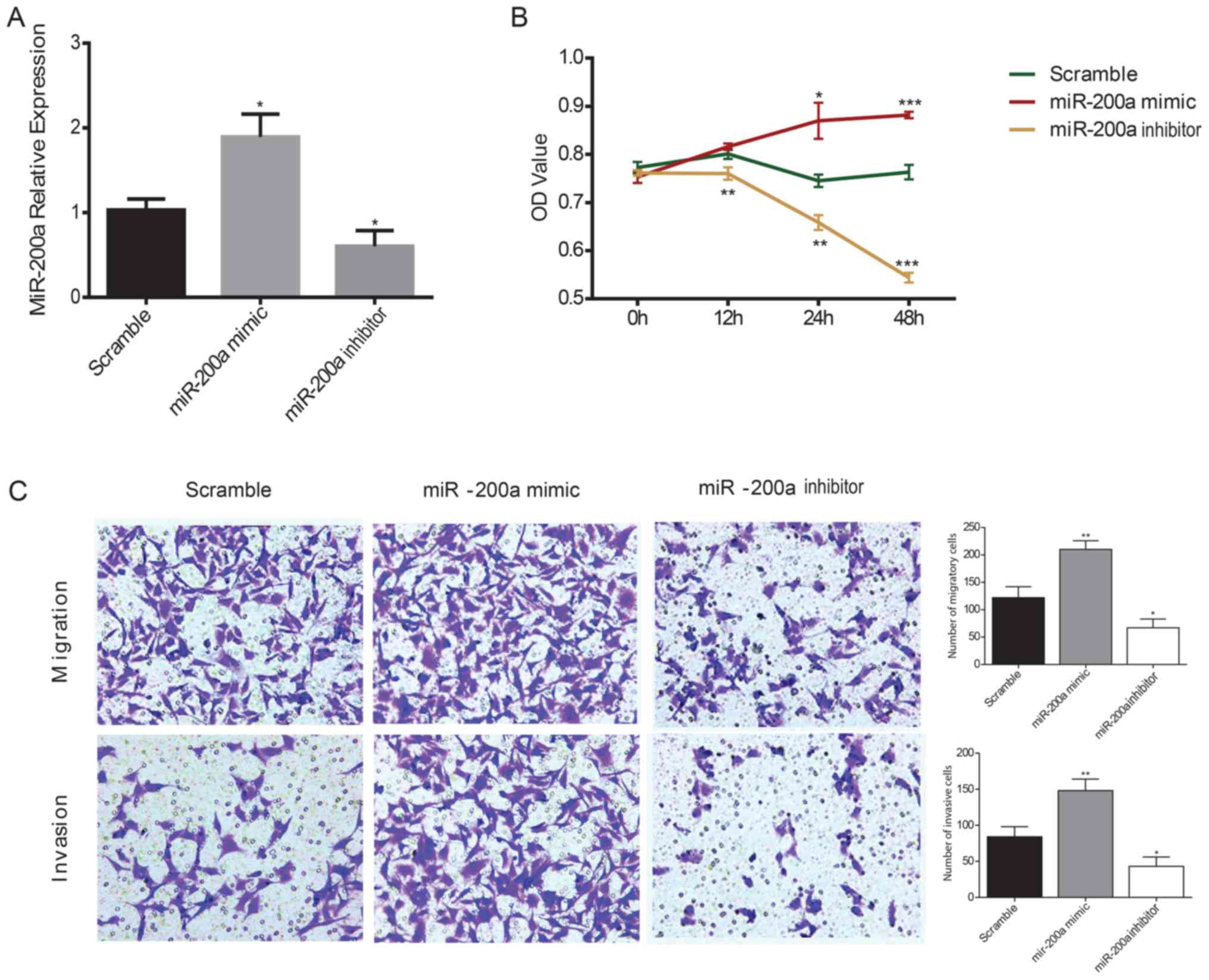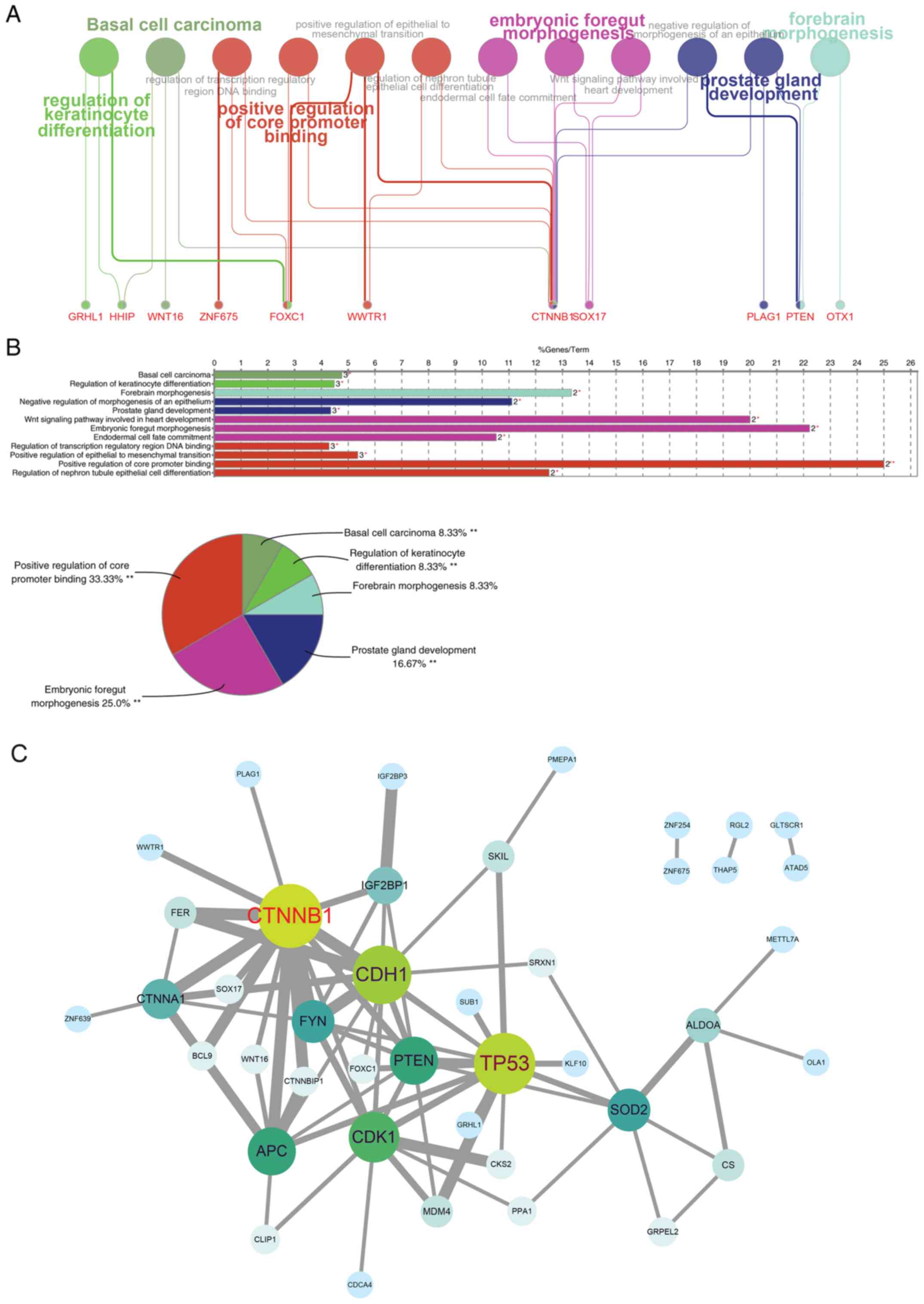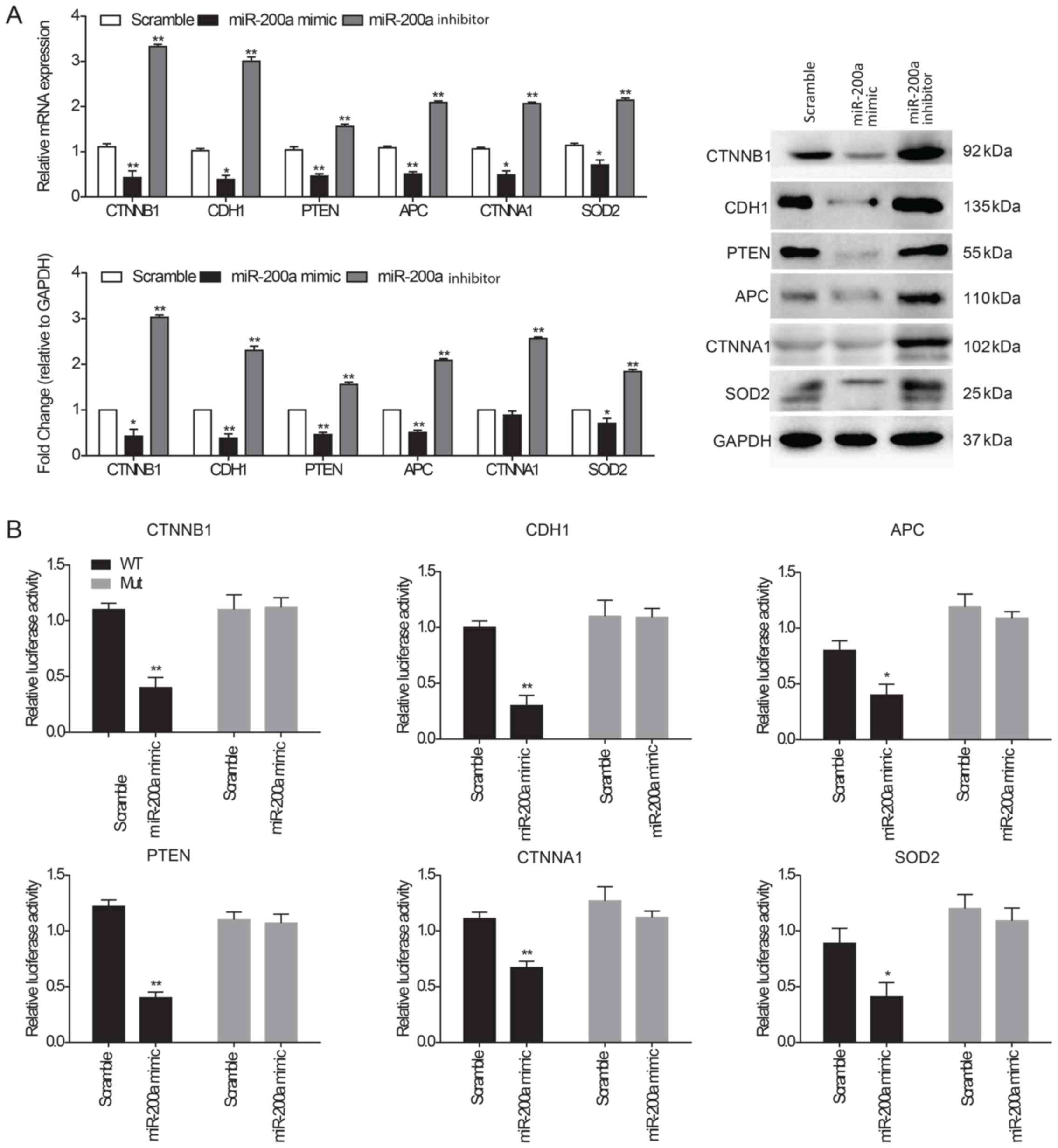|
1
|
Karamanou M, Markatos K, Papaioannou TG,
Zografos G and Androutsos G: Hallmarks in history of esophageal
carcinoma. J BUON. 22:1088–1091. 2017.PubMed/NCBI
|
|
2
|
Klingelhöfer D, Zhu Y, Braun M, Brüggmann
D, Schöffel N and Groneberg DA: A world map of esophagus cancer
research: A critical accounting. J Transl Med. 17:1502019.
View Article : Google Scholar : PubMed/NCBI
|
|
3
|
Torre LA, Bray F, Siegel RL, Ferlay J,
Lortet-Tieulent J and Jemal A: Global cancer statistics, 2012. CA
Cancer J Clin. 65:87–108. 2015. View Article : Google Scholar : PubMed/NCBI
|
|
4
|
Liu F, Wu K, Wu W, Chen Y, Wu H, Wang H
and Zhang W: miR203 contributes to preeclampsia via inhibition of
VEGFA expression. Mol Med Rep. 17:5627–5634. 2018.PubMed/NCBI
|
|
5
|
Liu F, Wu W, Wu K, Chen Y, Wu H, Wang H
and Zhang W: MiR-203 participates in human placental angiogenesis
by inhibiting VEGFA and VEGFR2 Expression. Reprod Sci. 25:358–365.
2018. View Article : Google Scholar : PubMed/NCBI
|
|
6
|
Jopling CL, Schütz S and Sarnow P:
Position-dependent function for a tandem microRNA miR-122-binding
site located in the hepatitis C virus RNA genome. Cell Host
Microbe. 4:77–85. 2008. View Article : Google Scholar : PubMed/NCBI
|
|
7
|
Shukla GC, Singh J and Barik S: MicroRNAs:
Processing, maturation, target recognition and regulatory
functions. Mol Cell Pharmacol. 3:83–92. 2011.PubMed/NCBI
|
|
8
|
Tutar L, Özgür A and Tutar Y: Involvement
of miRNAs and pseudogenes in cancer. Methods Mol Biol. 1699:45–66.
2018. View Article : Google Scholar : PubMed/NCBI
|
|
9
|
Bartel DP: MicroRNAs: Target recognition
and regulatory functions. Cell. 136:215–233. 2009. View Article : Google Scholar : PubMed/NCBI
|
|
10
|
Zhou SM, Zhang F, Chen XB, Jun CM, Jing X,
Wei DX, Xia Y, Zhou YB, Xiao XQ, Jia RQ, et al: miR-100 suppresses
the proliferation and tumor growth of esophageal squamous cancer
cells via targeting CXCR7. Oncol Rep. 35:3453–3459. 2016.
View Article : Google Scholar : PubMed/NCBI
|
|
11
|
Xu DD, Zhou PJ, Wang Y, Zhang L, Fu WY,
Ruan BB, Xu HP, Hu CZ, Tian L, Qin JH, et al: Reciprocal activation
between STAT3 and miR-181b regulates the proliferation of
esophageal cancer stem-like cells via the CYLD pathway. Mol Cancer.
15:402016. View Article : Google Scholar : PubMed/NCBI
|
|
12
|
Gao Z, Liu R, Liao J, Yang M, Pan E, Yin L
and Pu Y: Possible tumor suppressive role of the miR-144/451
cluster in esophageal carcinoma as determined by principal
component regression analysis. Mol Med Rep. 14:3805–3813. 2016.
View Article : Google Scholar : PubMed/NCBI
|
|
13
|
Okumura T, Kojima H, Miwa T, Sekine S,
Hashimoto I, Hojo S, Nagata T and Shimada Y: The expression of
microRNA 574-3p as a predictor of postoperative outcome in patients
with esophageal squamous cell carcinoma. World J Surg Oncol.
14:2282016. View Article : Google Scholar : PubMed/NCBI
|
|
14
|
Lv H, He Z, Wang H, Du T and Pang Z:
Differential expression of miR-21 and miR-75 in esophageal
carcinoma patients and its clinical implication. Am J Transl Res.
8:3288–3298. 2016.PubMed/NCBI
|
|
15
|
Sun J, Song K, Feng X and Gao S:
MicroRNA-367 is a potential diagnostic biomarker for patients with
esophageal squamous cell carcinoma. Biochem Biophys Res Commun.
473:363–369. 2016. View Article : Google Scholar : PubMed/NCBI
|
|
16
|
Sun L, Dong S, Dong C, Sun K, Meng W, Lv
P, Yin H, Ming L and He F: Predictive value of plasma miRNA-718 for
esophageal squamous cell carcinoma. Cancer Biomark. 16:265–273.
2016. View Article : Google Scholar : PubMed/NCBI
|
|
17
|
Matsuzaki J and Suzuki H: Role of
MicroRNAs-221/222 in digestive systems. J Clin Med. 4:1566–1577.
2015. View Article : Google Scholar : PubMed/NCBI
|
|
18
|
Phatak P, Byrnes KA, Mansour D, Liu L, Cao
S, Li R, Rao JN, Turner DJ, Wang JY and Donahue JM: Overexpression
of miR-214-3p in esophageal squamous cancer cells enhances
sensitivity to cisplatin by targeting survivin directly and
indirectly through CUG-BP1. Oncogene. 35:2087–2097. 2016.
View Article : Google Scholar : PubMed/NCBI
|
|
19
|
Zheng D, Ding Y, Ma Q, Zhao L, Guo X, Shen
Y, He Y, Wei W and Liu F: Identification of serum MicroRNAs as
novel biomarkers in esophageal squamous cell carcinoma using
feature selection algorithms. Front Oncol. 8:6742018. View Article : Google Scholar : PubMed/NCBI
|
|
20
|
Di Stefano V, Wang B, Parobchak N, Roche N
and Rosen T: RelB/p52-mediated NF-κB signaling alters histone
acetylation to increase the abundance of corticotropin-releasing
hormone in human placenta. Sci Signal. 8:ra852015. View Article : Google Scholar : PubMed/NCBI
|
|
21
|
Livak KJ and Schmittgen TD: Analysis of
relative gene expression data using real-time quantitative PCR and
the 2(-Delta Delta C(T)) method. Methods. 25:402–408. 2001.
View Article : Google Scholar : PubMed/NCBI
|
|
22
|
Zhu X, Er K, Mao C, Yan Q, Xu H, Zhang Y,
Zhu J, Cui F, Zhao W and Shi H: miR-203 suppresses tumor growth and
angiogenesis by targeting VEGFA in cervical cancer. Cell Physiol
Biochem. 32:64–73. 2013. View Article : Google Scholar : PubMed/NCBI
|
|
23
|
Lepage C, Rachet B, Jooste V, Faivre J and
Coleman MP: Continuing rapid increase in esophageal adenocarcinoma
in England and Wales. Am J Gastroenterol. 103:2694–2699. 2008.
View Article : Google Scholar : PubMed/NCBI
|
|
24
|
Chekouo T, Stingo FC, Doecke JD and Do KA:
miRNA-target gene regulatory networks: A Bayesian integrative
approach to biomarker selection with application to kidney cancer.
Biometrics. 71:428–438. 2015. View Article : Google Scholar : PubMed/NCBI
|
|
25
|
Zhao JY, Wang F, Li Y, Zhang XB, Yang L,
Wang W, Xu H, Liu DZ and Zhang LY: Five miRNAs considered as
molecular targets for predicting esophageal cancer. Med Sci Monit.
21:3222–3230. 2015. View Article : Google Scholar : PubMed/NCBI
|
|
26
|
Zeng JH, Xiong DD, Pang YY, Zhang Y, Tang
RX, Luo DZ and Chen G: Identification of molecular targets for
esophageal carcinoma diagnosis using miRNA-seq and RNA-seq data
from The Cancer Genome Atlas: A study of 187 cases. Oncotarget.
8:35681–35699. 2017.PubMed/NCBI
|
|
27
|
Chen L, Jin Y, Wang L, Sun F, Yang X, Shi
M, Zhan C, Shi Y and Wang Q: Identification of reference genes and
miRNAs for qRT-PCR in human esophageal squamous cell carcinoma. Med
Oncol. 34:22017. View Article : Google Scholar : PubMed/NCBI
|
|
28
|
Lu YF, Yu JR, Yang Z, Zhu GX, Gao P, Wang
H, Chen SY, Zhang J, Liu MY, Niu Y, et al: Correction to: Promoter
hypomethylation mediated upregulation of MicroRNA-10b-3p targets
FOXO3 to promote the progression of esophageal squamous cell
carcinoma (ESCC). J Exp Clin Cancer Res. 39:192020. View Article : Google Scholar : PubMed/NCBI
|
|
29
|
Ni XF, Zhao LH, Li G, Hou M, Su M, Zou CL
and Deng X: MicroRNA-548-3p and MicroRNA-576-5p enhance the
migration and invasion of esophageal squamous cell carcinoma cells
via NRIP1 down-regulation. Neoplasma. 65:881–887. 2018. View Article : Google Scholar : PubMed/NCBI
|
|
30
|
Liu W, Li M, Chen X, Zhu S, Shi H, Zhang
D, Cheng C and Li B: MicroRNA-1 suppresses proliferation, migration
and invasion by targeting Notch2 in esophageal squamous cell
carcinoma. Sci Rep. 8:51832018. View Article : Google Scholar : PubMed/NCBI
|
|
31
|
Kaneko Y, Saito S, Takahashi K, Kanamaru
R, Hosoya Y, Yamaguchi H, Kitayama J, Niki T, Lefor AK and Sata N:
Neuroendocrine carcinoma of the esophagus with an adenocarcinoma
component. Clin J Gastroenterol. 12:534–538. 2019. View Article : Google Scholar : PubMed/NCBI
|
|
32
|
Tsuchihashi K, Arita S, Fujiwara M,
Iwasaki K, Hirano A, Yoshihiro T, Nio K, Koga Y, Esaki M, Ariyama
H, et al: Metastatic esophageal carcinosarcoma comprising
neuroendocrine carcinoma, squamous cell carcinoma, and sarcoma: A
case report. Medicine (Baltimore). 97:e127962018. View Article : Google Scholar : PubMed/NCBI
|
|
33
|
Fujihara S, Kobayashi M, Nishi M, Yachida
T, Yoshitake A, Deguchi A, Muraoka A, Kobara H and Masaki T:
Composite neuroendocrine carcinoma and squamous cell carcinoma with
regional lymph node metastasis: A case report. J Med Case Rep.
12:2272018. View Article : Google Scholar : PubMed/NCBI
|
|
34
|
Morita M, Saeki H, Nakaji YU, Zaitsu Y,
Hirahashi M, Ohguri T, Oki E, Toh Y, Oda Y and Maehara Y:
Conversion to neuroendocrine carcinoma from squamous cell carcinoma
of the esophagus after definitive chemoradiotherapy. Anticancer
Res. 36:4045–4049. 2016.PubMed/NCBI
|
|
35
|
Yazıcı O, Aksoy S, Özhamam EU and Zengin
N: Squamous cell and neuroendocrine carcinoma of esophagus:
Collision versus composite tumor: A case report and review of
literature. Indian J Cancer. 52:603–604. 2015. View Article : Google Scholar : PubMed/NCBI
|
|
36
|
Yang L, Sun X, Zou Y and Meng X: Small
cell type neuroendocrine carcinoma colliding with squamous cell
carcinoma at esophagus. Int J Clin Exp Pathol. 7:1792–1795.
2014.PubMed/NCBI
|
|
37
|
Yu SJ, Yang L, Hong Q, Kuang XY, Di GH and
Shao ZM: MicroRNA-200a confers chemoresistance by antagonizing
TP53INP1 and YAP1 in human breast cancer. BMC Cancer. 18:742018.
View Article : Google Scholar : PubMed/NCBI
|
|
38
|
Sun Q, Zou X, Zhang T, Shen J, Yin Y and
Xiang J: The role of miR-200a in vasculogenic mimicry and its
clinical significance in ovarian cancer. Gynecol Oncol.
132:730–738. 2014. View Article : Google Scholar : PubMed/NCBI
|
|
39
|
Liu X, Du P, Han L, Zhang A, Jiang K and
Zhang Q: Effects of miR-200a and FH535 combined with taxol on
proliferation and invasion of gastric cancer. Pathol Res Pract.
214:442–449. 2018. View Article : Google Scholar : PubMed/NCBI
|
|
40
|
Yang W, Ning N and Jin X: The lncRNA H19
promotes cell proliferation by competitively binding to miR-200a
and Derepressing β-catenin expression in colorectal cancer. Biomed
Res Int. 2017:27674842017.PubMed/NCBI
|
|
41
|
Hu B, Qiu-Lan H, Lei RE, Shi C, Jiang HX
and Qin SY: Interleukin-9 promotes pancreatic cancer cells
proliferation and migration via the miR-200a/Beta-catenin axis.
Biomed Res Int. 2017:28310562017. View Article : Google Scholar : PubMed/NCBI
|
|
42
|
Chen F, Zhou H, Wu C and Yan H:
Identification of miRNA profiling in prediction of tumor recurrence
and progress and bioinformatics analysis for patients with primary
esophageal cancer: Study based on TCGA database. Pathol Res Pract.
214:2081–2086. 2018. View Article : Google Scholar : PubMed/NCBI
|
|
43
|
Wang L, Zhang Z, Yu X, Huang X, Liu Z,
Chai Y, Yang L, Wang Q, Li M, Zhao J, et al: Unbalanced YAP-SOX9
circuit drives stemness and malignant progression in esophageal
squamous cell carcinoma. Oncogene. 38:2042–2055. 2019. View Article : Google Scholar : PubMed/NCBI
|
|
44
|
Qi B, Wang Y, Chen ZJ, Li XN, Qi Y, Yang
Y, Cui GH, Guo HZ, Li WH and Zhao S: Down-regulation of
miR-30a-3p/5p promotes esophageal squamous cell carcinoma cell
proliferation by activating the Wnt signaling pathway. World J
Gastroenterol. 23:7965–7977. 2017. View Article : Google Scholar : PubMed/NCBI
|
|
45
|
Gao Y, Yi J, Zhang K, Bai F, Feng B, Wang
R, Chu X, Chen L and Song H: Downregulation of MiR-31 stimulates
expression of LATS2 via the hippo pathway and promotes
epithelial-mesenchymal transition in esophageal squamous cell
carcinoma. J Exp Clin Cancer Res. 36:1612017. View Article : Google Scholar : PubMed/NCBI
|
|
46
|
Zang B, Huang G, Wang X and Zheng S:
HPV-16 E6 promotes cell growth of esophageal cancer via
downregulation of miR-125b and activation of Wnt/β-catenin
signaling pathway. Int J Clin Exp Pathol. 8:13687–13694.
2015.PubMed/NCBI
|
|
47
|
Ge C, Wu S, Wang W, Liu Z, Zhang J, Wang
Z, Li R, Zhang Z, Li Z, Dong S, et al: miR-942 promotes cancer stem
cell-like traits in esophageal squamous cell carcinoma through
activation of Wnt/β-catenin signalling pathway. Oncotarget.
6:10964–10977. 2015. View Article : Google Scholar : PubMed/NCBI
|
|
48
|
Weiske J, Albring KF and Huber O: The
tumor suppressor Fhit acts as a repressor of beta-catenin
transcriptional activity. Proc Natl Acad Sci USA. 104:20344–20349.
2007. View Article : Google Scholar : PubMed/NCBI
|
|
49
|
Lillehoj EP, Lu W, Kiser T, Goldblum SE
and Kim KC: MUC1 inhibits cell proliferation by a
beta-catenin-dependent mechanism. Biochim Biophys Acta.
1773:1028–1038. 2007. View Article : Google Scholar : PubMed/NCBI
|
|
50
|
Meigs TE, Fedor-Chaiken M, Kaplan DD,
Brackenbury R and Casey PJ: Galpha12 and Galpha13 negatively
regulate the adhesive functions of cadherin. J Biol Chem.
277:24594–24600. 2002. View Article : Google Scholar : PubMed/NCBI
|
|
51
|
Yu Y, Wu J, Wang Y, Zhao T, Ma B, Liu Y,
Fang W, Zhu WG and Zhang H: Kindlin 2 forms a transcriptional
complex with β-catenin and TCF4 to enhance Wnt signalling. EMBO
Rep. 13:750–758. 2012. View Article : Google Scholar : PubMed/NCBI
|
|
52
|
Escobar DJ, Desai R, Ishiyama N, Folmsbee
SS, Novak MN, Flozak AS, Daugherty RL, Mo R, Nanavati D, Sarpal R,
et al: α-Catenin phosphorylation promotes intercellular adhesion
through a dual-kinase mechanism. J Cell Sci. 128:1150–1165. 2015.
View Article : Google Scholar : PubMed/NCBI
|
|
53
|
Zaoui K, Benseddik K, Daou P, Salaün D and
Badache A: ErbB2 receptor controls microtubule capture by
recruiting ACF7 to the plasma membrane of migrating cells. Proc
Natl Acad Sci USA. 107:18517–18522. 2010. View Article : Google Scholar : PubMed/NCBI
|
|
54
|
Sagara M, Kawasaki Y, Iemura SI, Natsume
T, Takai Y and Akiyama T: Asef2 and Neurabin2 cooperatively
regulate actin cytoskeletal organization and are involved in
HGF-induced cell migration. Oncogene. 28:1357–1365. 2009.
View Article : Google Scholar : PubMed/NCBI
|
|
55
|
Vazquez F, Ramaswamy S, Nakamura N and
Sellers WR: Phosphorylation of the PTEN tail regulates protein
stability and function. Mol Cell Biol. 20:5010–5018. 2000.
View Article : Google Scholar : PubMed/NCBI
|
|
56
|
Costa HA, Leitner MG, Sos ML, Mavrantoni
A, Rychkova A, Johnson JR, Newton BW, Yee MC, De La Vega FM, Ford
JM, et al: Discovery and functional characterization of a
neomorphic PTEN mutation. Proc Natl Acad Sci USA. 112:13976–13981.
2015. View Article : Google Scholar : PubMed/NCBI
|
|
57
|
Weydert C, Roling B, Liu J, Hinkhouse MM,
Ritchie JM, Oberley LW and Cullen JJ: Suppression of the malignant
phenotype in human pancreatic cancer cells by the overexpression of
manganese superoxide dismutase. Mol Cancer Ther. 2:361–369.
2003.PubMed/NCBI
|
|
58
|
Zhong W, Oberley LW, Oberley TD and St
Clair DK: Suppression of the malignant phenotype of human glioma
cells by overexpression of manganese superoxide dismutase.
Oncogene. 14:481–490. 1997. View Article : Google Scholar : PubMed/NCBI
|
|
59
|
Sarsour EH, Kalen AL and Goswami PC:
Manganese superoxide dismutase regulates a redox cycle within the
cell cycle. Antioxid Redox Signal. 20:1618–1627. 2014. View Article : Google Scholar : PubMed/NCBI
|
|
60
|
Oberley LW, Oberley TD and Buettner GR:
Cell division in normal and transformed cells: The possible role of
superoxide and hydrogen peroxide. Med Hypotheses. 7:21–42. 1981.
View Article : Google Scholar : PubMed/NCBI
|
|
61
|
Oberley LW, Oberley TD and Buettner GR:
Cell differentiation, aging and cancer: The possible roles of
superoxide and superoxide dismutases. Med Hypotheses. 6:249–268.
1980. View Article : Google Scholar : PubMed/NCBI
|
|
62
|
Taghavi N, Biramijamal F, Sotoudeh M,
Khademi H, Malekzadeh R, Moaven O, Memar B, A'rabi A and
Abbaszadegan MR: p16INK4a hypermethylation and p53, p16 and MDM2
protein expression in esophageal squamous cell carcinoma. BMC
Cancer. 10:1382010. View Article : Google Scholar : PubMed/NCBI
|
|
63
|
Lu J, Pan Y, Xia X, Gu Y and Lei Y:
Prognostic significance of mTOR and PTEN in patients with
esophageal squamous cell carcinoma. Biomed Res Int.
2015:4172102015. View Article : Google Scholar : PubMed/NCBI
|
|
64
|
Ishiguro H, Wakasugi T, Terashita Y,
Sakamoto N, Tanaka T, Mizoguchi K, Sagawa H, Okubo T and Takeyama
H: Decreased expression of CDH1 or CTNNB1 affects poor prognosis of
patients with esophageal cancer. World J Surg Oncol. 14:2402016.
View Article : Google Scholar : PubMed/NCBI
|
|
65
|
Xia H, Ng SS, Jiang S, Cheung WK, Sze J,
Bian XW, Kung HF and Lin MC: miR-200a-mediated downregulation of
ZEB2 and CTNNB1 differentially inhibits nasopharyngeal carcinoma
cell growth, migration and invasion. Biochem Biophys Res Commun.
391:535–541. 2010. View Article : Google Scholar : PubMed/NCBI
|
|
66
|
Asakura T, Yamaguchi N, Ohkawa K and
Yoshida K: Proteasome inhibitor-resistant cells cause EMT-induction
via suppression of E-cadherin by miR-200 and ZEB1. Int J Oncol.
46:2251–2260. 2015. View Article : Google Scholar : PubMed/NCBI
|
|
67
|
Suo HB, Zhang KC and Zhao J: MiR-200a
promotes cell invasion and migration of ovarian carcinoma by
targeting PTEN. Eur Rev Med Pharmacol Sci. 22:4080–4089.
2018.PubMed/NCBI
|


















